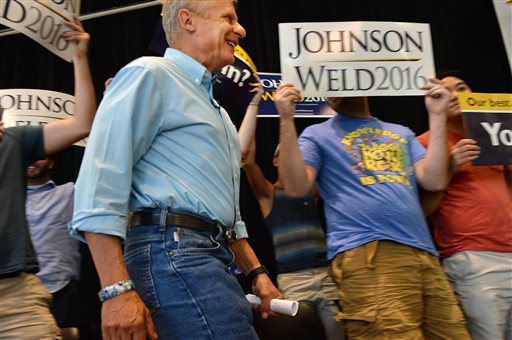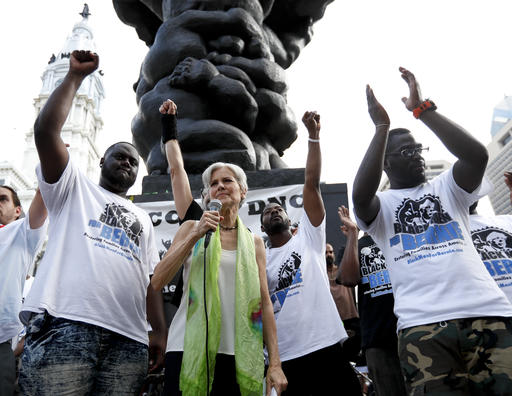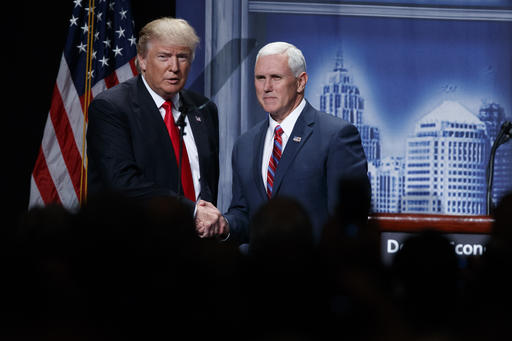
With fewer than 100 days until the general election, experts have weighed in on whether third party candidates will have a significant impact on the decision of Utah’s voters.
Libertarian Party candidate Gary Johnson has secured a spot on the Utah ballot alongside Donald Trump and Hillary Clinton. He is currently trying to gain enough traction to be included as a third member of the presidential debates. Jill Stein of the Green Party is currently fighting for a spot on the Utah ballot, and under state laws she may be included as a write-in.
When contemplating the power of third party candidates to swing an election, the example of Ralph Nader is frequently cited. During the historically close presidential election between Al Gore and George W. Bush in 2000, many Democrats accused Green Party member Nader of stealing votes from Gore in Florida, where Bush won by little more than 500 votes. Bush’s victory in the swing state of Florida was what enabled him to eventually win the White House.
The Spoiler Effect, also known as the Ralph Nader Effect, is the notion that third party candidates can “spoil” the election for their most ideologically similar major candidate. History indicates that Green Party candidates usually siphon away votes from the Democratic Party, while Libertarian candidates steal more votes from the Republicans.
Curtis Haring, editor-in-chief of the Utah Political Capitol magazine, said third party candidates could play a major role this November.
“The major political parties ignore that third party vote at their own peril,” Haring said. “Third parties do have, in my opinion, an enormous disruptive power.”
Donald Trump and Hillary Clinton both fared poorly in the Utah caucuses in March. Clinton lost to Bernie Sanders by 60 percentage points, and Donald Trump placed last among the three Republican contenders. Among the Republicans, Ted Cruz won every county in the Beehive State, leaving Donald Trump with zero Utah delegates.
Given the unpopularity of the two major presidential candidates in Utah, many voters are taking a closer look at third party candidates such as Johnson and Stein. Johnson, whose campaign headquarters are located in Salt Lake City, was found only one percentage point behind Clinton and three percentage points behind Trump in one recent poll by the Salt Lake Tribune. Other Utah polls show him between 10 and 16 percent in favorability ratings.
“Voting third party actually sends a very strong and powerful message to the closest major political party,” Haring said. “It sends the message that we’re not okay with this; we want a different voice.”
Because neither Clinton nor Trump was Utah’s first choice in March, several of the state’s voters are considering who they vote against as just as important — perhaps even more important — than who they vote for.
“This election, it seems, is not so much about who you support, but who you don’t support,” said BYU Democrats President Elect Alison Romano. “I think it’s kind of scary and sad that it’s devolved into such a case.”
While a vote for the Libertarian or Green Party tickets may seem like the “easy way out” for Utahns who dislike both Trump and Clinton, supporters of Stein and Johnson also have tough questions of their own to answer.

Because third parties siphon votes from the two major political parties, those inclined towards Stein or Johnson run the risk of indirectly helping a candidate they dislike. Many have even warned that a vote for Johnson is essentially the same as a vote for Clinton and that voting for Stein is essentially voting for Trump. Thus, third party voters must come to terms with this fact: voting for who you like is often quite different than voting against who you dislike.
“I think it’s really heartbreaking when people can’t vote what they feel like,” Romano said.
Under America’s two-party system, third party candidates have virtually no chance of defeating a Republican or Democrat in a presidential race, Haring said. The safest option for an opponent of Trump is to vote for Clinton, and vice versa.
But whether or not Utah’s third party supporters will vote against their conscience in order to block a candidate that they dislike from becoming president is yet to be determined.
“Voting should be the most personal thing you do,” Haring said. “I have no problem with people voting according to conscience, but I also see the practical side of things. A third party is not going to win anytime soon.”
According to Boyd Matheson, President of the Utah-based political think tank The Sutherland Institute, the option to vote “straight party” may ease the conscience of those who dislike both Clinton and Trump.
The “straight party” option constitutes a vote for every candidate that a given political party has on a general election ballot. This allows you to vote for the political party of your choice instead of expressly endorsing its nominee.
Utah is one of only nine states which allows the option of straight-party voting.
“I think you could see a historically high level of Utahns who end up just voting straight party,” Matheson said. “That way they can just go into the booth, push one button, and then walk away and maybe feel a little bit better about their choice.”
Utah County Republican Party Chairman Craig Frank said Trump’s and Clinton’s respective running mates may also help prevent the spoiler effect from occurring in the Beehive State by drawing more of Utah’s voters to the Republican or Democratic parties.
Tim Kaine, a U.S. senator from Virginia and Hillary Clinton’s VP pick, is the only member of a presidential ticket this year to receive positive favorability ratings nationwide. He is also a close friend of Utah state delegate Patrice Arent.

Indiana Governor Mike Pence, who is running alongside Donald Trump, also has a positive reputation in Utah. Utah Governor Gary Herbert has praised Pence as both qualified and consistent.
According to Frank, Pence’s popularity and reputation as a conservative will help the Republican Party gain ground in Utah this November.
“Pence is popular enough to bring in enough of a margin for Donald Trump,” Frank said. “That will solidify the Republican ticket.”

Haring, Matheson and Frank have all expressed confidence that the spoiler effect will not take place in Utah this November. They expect the traditionally conservative state to vote Republican as always, though the margin will perhaps be more narrow this time around.
“I don’t think Utah will be a spoiler state,” Matheson said. “The Clintons have never won anything in Utah, and I don’t see that changing.”
Haring and Frank also noted that Johnson’s popularity, even when combined with Trump’s unpopularity, will not be enough to turn Utah into a blue state.
“Past indication is that even the worst Republican is going to do 65 percent in Utah,” Haring said. “If Johnson shocks the world and gets 10, that’s still 55 percent for Trump.”




